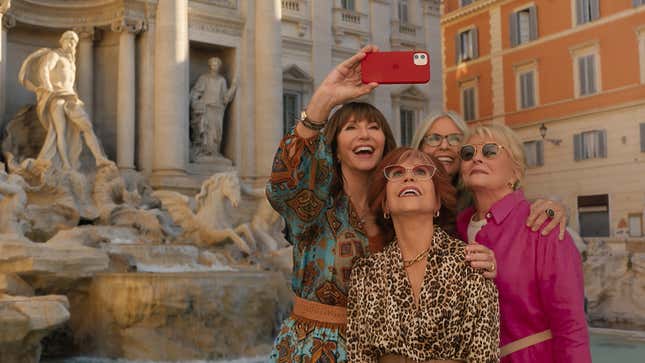‘Book Club: The Next Chapter’ Has No Business Being As Entertaining As It Is
Conservative at heart and sitcom-like in its approach, the spicier sequel shows just how far charm can go.
EntertainmentMovies

Book Club: The Next Chapter resists taking a page from anything resembling literature. It is not a story so much as a series of mishaps and quips. It is a comedy of situations, a nearly two-hour-long episode of [fill in the blank with your favorite all-women TV show foursome, though obviously Golden Girls fits best]. Luckily for it and us, that’s all it has to be. The four screen legends who portray our protagonists—Jane Fonda, Diane Keaton, Candice Bergen, and Mary Steenburgen—are by now settled into their roles to the point of inhabitation. Compared to the rather milquetoast first Book Club (from 2018), the sequel’s lines are funnier, the gags are gaggier. I don’t know why this is exactly. I can’t tell if it’s because 1) I was stoned when I saw it, 2) I watched it with a voraciously appreciative audience, or 3) everyone in the cast is more comfortable this time around. Whatever it is, Book Club: The Next Chapter (in theaters Friday) struck me as superior, sharper, and more worthwhile than its predecessor in every way.
They aren’t even reading books this time! I mean, they do briefly, as the movie opens with a lockdown-set Zoom sequence. (There are also a few brief references to Paulo Coelho’s The Alchemist.) Via video chat, Keaton’s bumbling Diane fumbles with the technology, muting herself and then turning into a potato by filter. They read Normal People. We learn that the pandemic has caused the restaurant that Steenburgen’s Carol runs to close, and her husband Bruce (Craig T. Nelson) has a “minor” heart attack. Court’s out of session for Bergen’s judge character Sharon. She soon retires. Fonda’s Viv is still leading with her sexuality, much like the Golden Girls’ Blanche, even with no new 50 Shades of Grey books to be inspired by. She’s also engaged to her once long-lost love Arthur (Don Johnson), and per the opening narration, the movie sets out to answer the question, “How does a woman in her 70s end up getting married?”
-

-

-

-

-

-

-

-

-

-

-

-

-

-

-

-

-

-

-

-

-

-

-

-

-

-

-

-

-

-

-

-

-

-

-

-

-

-

-

-








































